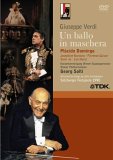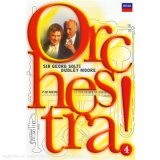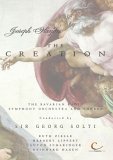![Die Entfuhrung Aus Dem Serail - The Royal Opera - Mozart [1988]](/pictures/1045499.jpg) Die Entfuhrung Aus Dem Serail - The Royal Opera - Mozart | DVD | (01/11/1997)
from £10.78
| Saving you £8.47 (88.97%)
| RRP
Die Entfuhrung Aus Dem Serail - The Royal Opera - Mozart | DVD | (01/11/1997)
from £10.78
| Saving you £8.47 (88.97%)
| RRP Mozart's comic masterpiece is set in a Turkish palace and tells the exciting and amusing story of the 'escape from the harem'. In this acclaimed production from The Royal Opera by Elijah Moshinsky filmed in 1988 the Turkish atmosphere is created by Timothy O'Brien's imaginative set of garden and crumbling palace strikingly complemented by Sir Sidney Nolan's colourful front and backcloths. The Spanish nobleman Belmonte is ably sung by Deon van der Walt and his beloved Konstanze is sung by Inga Nielsen with both dramatic conviction and brilliant secure coloratura. The actor Oliver Tobias gives a sensuous and powerful performance in the speaking role of Pasha Selim and Lillian Watson is a charming Blonde.
![Verdi: Otello -- Royal Opera House/Solti [1992]](/pictures/1028623.jpg) Verdi: Otello -- Royal Opera House/Solti | DVD | (29/10/2001)
from £N/A
| Saving you £N/A (N/A%)
| RRP
Verdi: Otello -- Royal Opera House/Solti | DVD | (29/10/2001)
from £N/A
| Saving you £N/A (N/A%)
| RRP A coproduction by BBC Covent Garden Pioneer and the Royal Opera House of Verdi's classic opera about the Moor who loved not wisely but too well. Conducted by George Solti.
![Verdi - Otello [1992]](/pictures/1082439.jpg) Verdi - Otello | DVD | (31/03/2008)
from £15.25
| Saving you £-0.26 (N/A%)
| RRP
Verdi - Otello | DVD | (31/03/2008)
from £15.25
| Saving you £-0.26 (N/A%)
| RRP Giuseppe Verdi - The Royal Opera Otello - At the Royal Opera House.
![R. Strauss: Der Rosenkavalier - Royal Opera House/Solti [1985]](/pictures/1033427.jpg) R. Strauss: Der Rosenkavalier - Royal Opera House/Solti | DVD | (23/02/2004)
from £20.00
| Saving you £-2.01 (N/A%)
| RRP
R. Strauss: Der Rosenkavalier - Royal Opera House/Solti | DVD | (23/02/2004)
from £20.00
| Saving you £-2.01 (N/A%)
| RRP Strauss' dazzling opera Der Rosenkavalier set in 1740's Vienna combines farce romance and a world of weary acknowledgement of getting older. It features some of the most gorgeous music ever written for the female voice.
![Mozart: Requiem [1991]](/pictures/1025300.jpg) Mozart: Requiem | DVD | (10/05/2004)
from £N/A
| Saving you £N/A (N/A%)
| RRP
Mozart: Requiem | DVD | (10/05/2004)
from £N/A
| Saving you £N/A (N/A%)
| RRP 1991 was the 200th anniversary of the death of Wolfgang Amadeus Mozart. To mark the occasion Sir Georg Solti conducted this stellar concert offering a performance of ""Requiem"" delivered exactly as the original composer intended. The hallowed surroundings of Saint Stephen's Cathedral in Vienna provided an apt location for the concert particularly as it's where Mozart's funeral rites were conducted in 1791.
![Great Composers - Bach / Mozart [2001]](/pictures/1028654.jpg) Great Composers - Bach / Mozart | DVD | (01/07/2001)
from £24.07
| Saving you £-6.08 (N/A%)
| RRP
Great Composers - Bach / Mozart | DVD | (01/07/2001)
from £24.07
| Saving you £-6.08 (N/A%)
| RRP The BBC TV series Great Composers, broadcast in 1997, takes an introductory look at key figures of European classical music. Bach (1685-1750) is a difficult composer to survey historically, partly because his life as a professional musician was restricted to several provincial German towns. Yet the vast body of music he produced is well covered, with a representative sample performed mainly on instruments of Bach's day. There's also consideration of his cultural importance as the effective progenitor of modern European music and enough anecdotal evidence to suggest a lively, combative personality in his own right. The life of Mozart (1756-1791) is easier to document, with his years as a child prodigy travelling the European cultural circuit, the difficult adolescent years in Salzburg and Paris and the rise and fall of his freelance career in Vienna all amply illustrated here. Again, a well-chosen selection of music, accompanied by thought-provoking comments from a range of musicians and historians, gently exploding the myth of the Amadeus film in the process. This is informal, informing, and worth acquiring. On the DVD: The disc offers crisp Dolby 2.0 stereo and 4:3 ratio, with generous and well-chosen access points--13 for Bach, 16 for Mozart. Subtitles are offered in five languages, and you'll need to select the English option so that the German and Italian speaking contributors come with translation. Those with DVD-ROM can additionally access up-to-date articles on these composers. --Richard Whitehouse
![Great Composers - Vol. 3 - Mahler / Tchaikovsky / Puccini [1997]](/pictures/1028530.jpg) Great Composers - Vol. 3 - Mahler / Tchaikovsky / Puccini | DVD | (18/03/2002)
from £N/A
| Saving you £N/A (N/A%)
| RRP
Great Composers - Vol. 3 - Mahler / Tchaikovsky / Puccini | DVD | (18/03/2002)
from £N/A
| Saving you £N/A (N/A%)
| RRP This three-hour compilation surveying the life and works of Tchaikovsky, Puccini and Mahler completes the BBC Great Composers series (the two previous releases contain the pairings of Bach/Mozart and Beethoven/Wagner). It's a splendid series, full of judiciously collected biographical information, lively and telling visuals, colourful anecdotes and excellent excerpted performances of the composers' best works. The directors' styles are very different, from Kriss Rusmanis' impressionistic approach (with an early chamber piece of Mahler's accompanied by shots of rippling brooks and dappled sunlight) to Chris Hunt's more forthright take on Puccini, but each is well tailored to the subject matter. There is a certain amount of psychological speculation in each case (Mahler may have inherited his sense of irony from watching nine of his siblings die while the jolly life of his father's tavern continued unabated, for example) but there's nothing outrageous. If you haven't hooked up your TV to some decent speakers the performances may sound a little pinched, but they are so good the quality shines through nonetheless; particularly noteworthy is Thomas Hampson's glorious reading of excerpts from Kindertotenlieder, and Georg Solti is on top form. On the DVD: Great Composers on disc comes with subtitles in English, French, German, Spanish and Italian, but no other special features. --Warwick Thompson
![La Damnation De Faust - Berlioz [1989]](/pictures/1036596.jpg) La Damnation De Faust - Berlioz | DVD | (03/01/2006)
from £54.99
| Saving you £-35.00 (N/A%)
| RRP
La Damnation De Faust - Berlioz | DVD | (03/01/2006)
from £54.99
| Saving you £-35.00 (N/A%)
| RRP Hector Berlioz's (1803-1869) legende dramatique about a man named Faust who sells his soul to the devil in exchange for knowledge. Recorded live at the Royal Albert Hall in 1989. Georg Solti conducts.
![Kiri Te Kanawa - Dame Kiri Te Kanawa - A Portrait [1991]](/pictures/1028631.jpg) Kiri Te Kanawa - Dame Kiri Te Kanawa - A Portrait | DVD | (24/08/2001)
from £21.58
| Saving you £-1.59 (-8.00%)
| RRP
Kiri Te Kanawa - Dame Kiri Te Kanawa - A Portrait | DVD | (24/08/2001)
from £21.58
| Saving you £-1.59 (-8.00%)
| RRP A portrait of one of the most famous sopranos of the twentieth and twenty-first centuries filmed over a year. The camera follows her on her trips to New Zealand and the San Francicsco Opera. The DVD also includes recordings of Arias by Handel Charpentier Puccini Cilea and Richard Strauss.
 Great Composers - Vol. 2 - Beethoven / Wagner | DVD | (25/02/2002)
from £N/A
| Saving you £N/A (N/A%)
| RRP
Great Composers - Vol. 2 - Beethoven / Wagner | DVD | (25/02/2002)
from £N/A
| Saving you £N/A (N/A%)
| RRP The second volume of the BBC's excellent Great Composers series consists of two hour-long episodes devoted to Beethoven and Wagner respectively. The format in both cases is that of a standard "life and works" biography, but what makes these episodes so attractive is the high quality of the visual material and the engrossing nature of the insights offered from the contributors. For example, it's fascinating to hear the lead violin of the Lindsay Quartet discuss the personal significance of a certain Beethoven phrase just after Charles Rosen has drawn a parallel with the composer's use of form and the speeches of Robespierre. If this makes the whole project sound as wholesome and dull as dry muesli, everyone also seems alive to the human idiosyncrasies of the subjects: we learn, among other things, that the utterly humourless Cosima Wagner used to keep her husband's eyelashes and carry them around with her in a bag. The musical excerpts are both performed--by the Berlin State Opera Orchestra and other groups--and filmed with panache. Kenneth Branagh narrates. All in all, a good introduction to both composers.--Warwick Thompson
 Verdi - Un Ballo In Maschera - Verdi | DVD | (01/04/2005)
from £N/A
| Saving you £N/A (N/A%)
| RRP
Verdi - Un Ballo In Maschera - Verdi | DVD | (01/04/2005)
from £N/A
| Saving you £N/A (N/A%)
| RRP John Schlesinger directs Placido Domingo in Verdi's opera...
 Orchestra! | DVD | (10/09/2007)
from £N/A
| Saving you £N/A (N/A%)
| RRP
Orchestra! | DVD | (10/09/2007)
from £N/A
| Saving you £N/A (N/A%)
| RRP Hosted by Sir Georg Solti and Hollywood star Dudley Moore Orchestra! is the landmark Channel 4 TV series from 1991 introducing the modern symphony orchestra. The 2-DVD set traces the development of the orchestra from the time of Bach and Handel to the present day. It includes all eight programmes originally broadcast on Channel 4: 1. Introduction to the Orchestra 2. Upper Strings 3. Woodwind 4. Lower Strings 5. Brass 6. Percussion 7. Piano 8. The Conductor Featuring young musicians from around the world this is an entertaining and educational celebration of the orchestra.
![Anton Bruckner: Symphony No. 3 / Igor Stravinsky: Symphony In Three Movements [1993]](/pictures/1028558.jpg) Anton Bruckner: Symphony No. 3 / Igor Stravinsky: Symphony In Three Movements | DVD | (25/02/2002)
from £7.34
| Saving you £12.65 (172.34%)
| RRP
Anton Bruckner: Symphony No. 3 / Igor Stravinsky: Symphony In Three Movements | DVD | (25/02/2002)
from £7.34
| Saving you £12.65 (172.34%)
| RRP This DVD consists of two live concerts given by Sir George Solti with the Baravian Radio Symphony Orchestra in 1993 at the Philharmonic am Gasteig in Munich.
![Beethoven: Piano Concerto No. 1 / Symphony No. 7 / Overture To Coriolan [1987]](/pictures/1028720.jpg) Beethoven: Piano Concerto No. 1 / Symphony No. 7 / Overture To Coriolan | DVD | (18/12/2000)
from £22.19
| Saving you £-2.20 (N/A%)
| RRP
Beethoven: Piano Concerto No. 1 / Symphony No. 7 / Overture To Coriolan | DVD | (18/12/2000)
from £22.19
| Saving you £-2.20 (N/A%)
| RRP The London Symphony Orchestra, Solti and Perahia in an all-Beethoven performance could hardly be anything but first class. This concert, which took place in 1987 to mark the fifth anniversary of the opening of the Barbican Arts Centre in London, also benefits from Solti's astute programming. Asked that his choice of music should reflect the policy of the venue in offering "variety in unity", the conductor selected the brief but thickly textured Coriolan Overture (splendidly un-ponderous under Solti's baton), the sprightly First Piano Concerto (here handled with kid gloves by Perahia) and the ebullient Seventh Symphony. The latter is marred at the outset by a spot-the-downbeat domino effect from the orchestra but this is swept away after a few bars to allow Solti's usual bravura to carry the concept off superbly, although his energised and convulsive old-school podium style is infuriatingly distracting when exposed to the merciless scrutiny of the cameras. Musically, however, the results are a delight, with some immaculate section playing, notably from the woodwinds. The disc includes a trailer for two other Arthaus releases. --Roger Thomas
![Solti - The Making Of A Maestro [2001]](/pictures/1032713.jpg) Solti - The Making Of A Maestro | DVD | (15/10/2001)
from £25.90
| Saving you £-5.91 (-29.60%)
| RRP
Solti - The Making Of A Maestro | DVD | (15/10/2001)
from £25.90
| Saving you £-5.91 (-29.60%)
| RRP The Making of a Maestro is a moving film of the life of conductor Sir Georg Solti, completed by producer/director Peter Maniura shortly before Solti's death in 1997. One of the most dynamic conductors of the 20th century, Solti gained something of a reputation as a tartar on the rostrum--"like playing for Mephisto," as one member of the Chicago Symphony puts it. Yet it's theatre director Sir Peter Hall's phrase, "a deeply lyrical soul", that comes to the fore watching this beautifully photographed film from the BBC's Omnibus series. Solti may have driven his orchestras and singers to a point where some of them felt cajoling became bullying, but it was always at the service of the music. This documentary sensibly does not take a view on Solti's ranking in the hierarchy of great conductors; instead Maniura wisely lets the conductor's words tell the story, making this film a very personal one. Over half the running time is devoted to Solti's upbringing and post-war years in Munich, where he built up the bombed-out opera house from scratch. Solti's friendship with Richard Strauss makes for a poignant interlude. His initial unpopularity at Covent Garden, where the opera posters were frequently daubed "Solti must go", his achievement at raising their orchestral standards, as well as his later starrier role as conductor of the Chicago Symphony, are also given their full due. Maniura handles the musical soundtrack with sensitivity, pointing up many striking images with music to create indelible impressions. The film concludes with Solti at his grandparents' grave reflecting without bitterness on those relatives--such as his father--who were never buried but disappeared in the Holocaust. The Making of a Maestro is an inspirational film from which the viewer cannot but help take heart. On the DVD: No special features to speak of, although the DVD trailer promotes other ArtHaus Musik productions, including their award-winning Damnation of Faust, the Penderecki choral work The Seven Gates of Jerusalem, Claudio Abbado conducting a New Year's Gala and Herbert Blomstedt a performance of Beethoven's Fifth.--Adrian Edwards
 Georg Solti - In Rehearsal | DVD | (24/10/2003)
from £19.02
| Saving you £0.97 (4.90%)
| RRP
Georg Solti - In Rehearsal | DVD | (24/10/2003)
from £19.02
| Saving you £0.97 (4.90%)
| RRP A look at the conductor Georg Solti during his time as music director at Covent Garden. Rehearsals and performances include Wagner's Tannhauser and Berlioz's Hungarian March.
![Georg Solti - Sir Georg Solti In Concert [1990]](/pictures/1045521.jpg) Georg Solti - Sir Georg Solti In Concert | DVD | (29/05/2006)
from £26.56
| Saving you £-6.57 (-32.90%)
| RRP
Georg Solti - Sir Georg Solti In Concert | DVD | (29/05/2006)
from £26.56
| Saving you £-6.57 (-32.90%)
| RRP Shostakovich / Tchaikovsky: Sir Georg Solti In Concert
![Bela Bartok - After the Storm [1989]](/pictures/1086575.jpg) Bela Bartok - After the Storm | DVD | (25/08/2008)
from £N/A
| Saving you £N/A (N/A%)
| RRP
Bela Bartok - After the Storm | DVD | (25/08/2008)
from £N/A
| Saving you £N/A (N/A%)
| RRP A detailed and often revealing portrait of the last five years of the composer's life - The Times. The composer's friends and colleagues including Sir Georg Solti and Yehudi Menuhin join his sons Peter and Bela Jr. to tell the story of Bartok's years of exile in America. After his journey to New York in 1940 from war-torn Europe he found himself lost in an unfamiliar culture. He was to spend the rest of his life there fighting sickness poverty and failure. Nevertheless consoled by the cycles of nature his last five years produced some of his greatest and most moving music.
 Kiri Te Kanawa - Opera in the Outback | DVD | (25/09/2000)
from £N/A
| Saving you £N/A (N/A%)
| RRP
Kiri Te Kanawa - Opera in the Outback | DVD | (25/09/2000)
from £N/A
| Saving you £N/A (N/A%)
| RRP Opera in the Outback features internationally renowned diva Dame Kiri Te Kanawa singing a superb selection of songs from opera favorites such as Puccini's Tosca through to the popular classics of Richard Rogers and Andrew Lloyd Webber. Dame Kiri is also joined by the Adnymathanha Women's Choir the region's indigenous women's choir for the world debut of the Warrioota Song. Set against the spectacular backdrop of Yalkarinha Gorge in the South Australian Flinders Ranges Opera in the Outback is a truly magical event. Track List / Composer: 1. Prince Igor Overture / Borodin 2. Bailero / Canteloube 3. Malurous qu'o uno fenno / Canteloube 4. La Delaissado / Canteloube 5. Lou Boussu / Canteloube 6. Vissi d'arte / Puccini 7. Signore ascolta / Puccini 8. Un bel di vedremo / Puccini 9. Adagio / Khachaturian 10.Wayanta Lullaby / Traditional 11.Warrioota Song / Soutelle 12. Viliwarunha manyinga / Traditional 13. Marietta's Lied / Korngold 14. Chanson d'enfance / Lloyd Webber 15. Unexpected Song / Lloyd Webber 16. The Jellicle Ball / Lloyd Webber 17. How Deep Is The Ocean / Berlin 18. I Believe / Drake Shirl Graham Stillman 19. You'll Never Walk Alone / Rodgers 20. Summertime / Gershwin 21. O mio babbino caro / Puccini
 The Creation | DVD | (14/11/2005)
from £42.78
| Saving you £-22.79 (N/A%)
| RRP
The Creation | DVD | (14/11/2005)
from £42.78
| Saving you £-22.79 (N/A%)
| RRP The story of The Creation forms the content of the work told by three archangels: the highly acclaimed soprano Ruth Ziesak sings Gabriel; with Tenor Herbert Lippert as Uriel; and bass Reinhard Hagen as Raphael. The last musical climax of the work a magnificent duet depicting the mutual love of the human beings is sung by baritone Anton Scharinger (Adam) and Ruth Ziesak (Eve).

Please wait. Loading...
This site uses cookies.
More details in our privacy policy